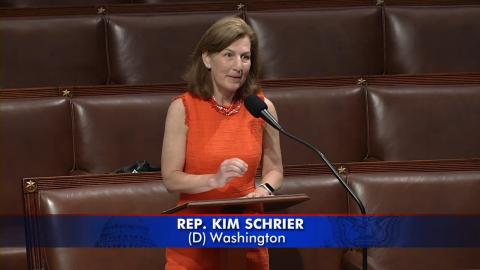Congresswoman Schrier’s Bill to Streamline Hydropower Licensing Passes the House
Bipartisan Legislation Supports Washington State’s Clean Energy Sector, Bolsters Affordable Energy by Improving Hydropower Licensing Transparency
WASHINGTON, DC - Yesterday, the House passed Congresswoman Kim Schrier’s M.D. (WA-08) Hydropower Licensing Transparency Act. The bipartisan legislation supports Washington’s clean energy sector and affordable energy for ratepayers by enhancing efficiency and transparency for all parties involved in the hydropower dam licensing process. Congresswoman Schrier introduced this bill alongside Congressman Russ Fulcher (ID-01).

“The Hydropower Licensing Transparency Act will provide greater transparency regarding progress made on hydropower dam licensing and make the overall process more efficient,” said Congresswoman Schrier. “I am proud to join my colleagues to pass this bill that will help our nation meet rising energy demand by streamlining the permitting of clean, affordable energy.”
"Hydropower is an essential and dependable baseload energy source for the Northwest,” said Congressman Russ Fulcher. "I am proud to support the Hydropower Licensing Transparency Act, H.R. 3657, with my colleague Representative Kim Schrier of Washington. This legislation requires the Federal Energy Regulatory Commission (FERC) to report annually on its progress in getting crucial hydropower facilities relicensed. FERC has not demonstrated its ability to license and relicense facilities in a timely manner to meet the growing demands of the region and support this clean energy. More congressional oversight is needed to increase transparency, address bottlenecks, and help ensure applicants can move through FERC’s process more efficiently."
“Thanks to Congresswoman Schrier’s leadership, the Hydropower Licensing Transparency Act will help provide accountability so that our nation’s hydropower resources aren’t caught up in unnecessary permitting delays,” said Kirk Hudson, general manager of Chelan County public utility district. “Our community and Washington state are powered by affordable, reliable hydropower, which is essential to meeting our region’s rapidly increasing energy demand. This legislation recognizes the importance of transparent and timely processes to license and maintain this critical generation.”
"The Hydropower Relicensing Transparency Act is a commonsense, bipartisan step toward greater accountability and public trust in how our rivers are managed,” said Thomas O’Keefe, PhD, Director of Policy and Science, American Whitewater. “By requiring the Federal Energy Regulatory Commission to provide annual updates on the status of pending hydropower relicensing proceedings, this bill empowers communities, Tribes, resource agencies, and stakeholders with the information they need to ensure that these critical decisions reflect today’s environmental values, energy priorities, and public interests."
"It takes longer to relicense an existing hydropower facility than to license a new nuclear plant. It's baffling! I applaud Reps. Schrier and Fulcher for advancing the 'Hydropower Licensing Transparency Act,' an important first step toward much-needed hydropower licensing reform,” said Malcolm Woolf, President and CEO of the National Hydropower Association. "The Hydropower Licensing Transparency Act will help shine a spotlight on the prohibitively long, costly, and decentralized relicensing process that hinders new development and risks early license surrender of existing clean, affordable electricity resources. I urge the Senate to send this bill to President Trump's desk as soon as possible."
MORE INFORMATION ON BILL:
Hydropower dams must relicense their dams with the Federal Energy Regulatory Commission (FERC) in order to continue operating a facility every 30 to 50 years. On average, relicensing a hydropower facility takes between seven and ten years to complete. According to a recent DOE report, FERC relicensing activity is expected to more than double in the coming decade. In addition, applicants seeking licenses for new hydropower dams are the most sensitive to licensing costs and delays. Existing projects have existing revenue streams to finance relicensing costs, but new project costs are covered by the project developer.
The bill will streamline and enhance the efficiency of this process by helping maintain resource adequacy in the Pacific Northwest through the requirement that the Federal Energy Regulatory Commission (FERC) provide an annual report to Congress on the status of the licensing process for each hydropower dam license application.
You can watch Congresswoman Schrier’s full remarks on the bill here.